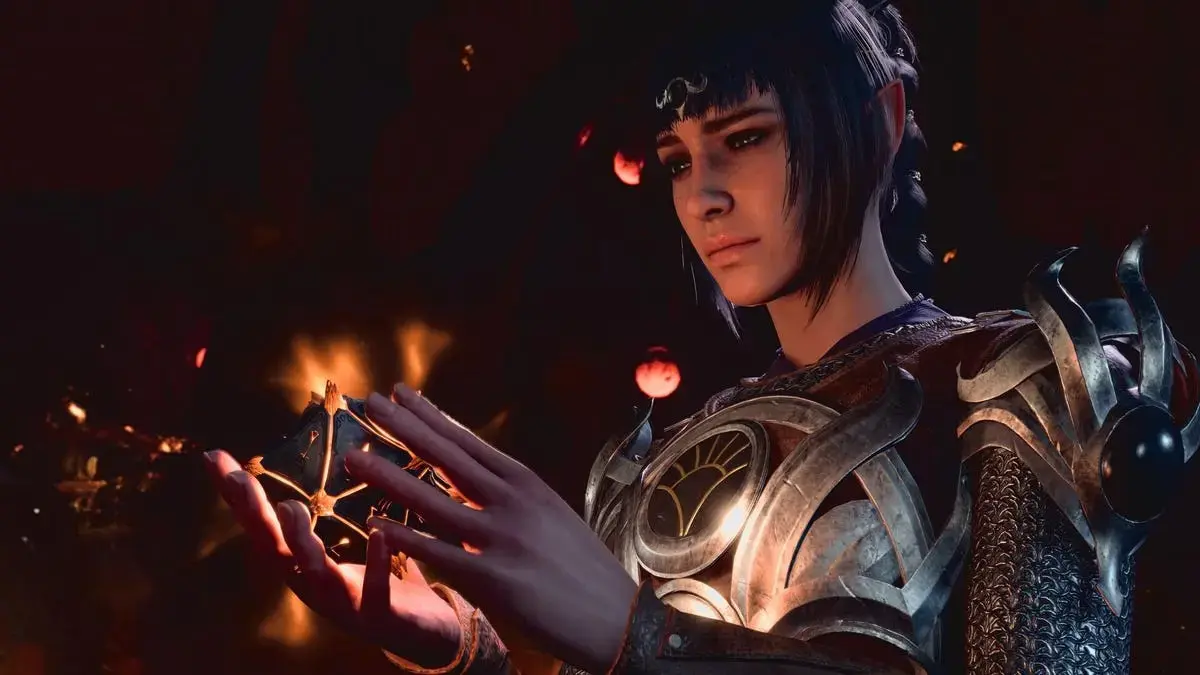If reception to Baldur’s Gate says anything, it’s that people hate microtransactions in their AAA games.
That article completely misses the forrest for the trees.
It’s a complete game. It was created with vision, passion, love, and complete creative freedom. It has a great story and interesting characters. It provides lots of player agency. It is unflinchingly candid, mature, and uncensored. Your choices, actions, and inaction ACTUALLY MATTERS. There is no DRM. There are no live service strings. You can play alone and/or with friends. There are no strangers or PvP to ruin your game. And yes, there are also no micro-transactions.
The lesson that BG3 offers isn’t just one thing… it’s a LOT of things. But the best way to sum it up is: it’s a great game and it treats players/customers with respect.
I think the most important part is that it launched without DRM on GOG and was able to be pirated from day 1 and it STILL was a huge success because people knew that the game isn’t trying anything shady to get even more money from you
It’s just something people actually want to support and not like people feel like even if they buy the game they only have half an experience if they don’t spend more money later
I really hope the next financial report from Larian is making people think differently about the necessity of putting aggressive DRM in their games
People don’t pirate because they don’t want to pay - they pirate because they don’t trust the game to bit pull more shady shit later and not be worth it in the end
-800k concurent player on launch
-no drm and can be pirated on first day
-some exec: that could’ve been higher if you get Denuvo in it.
Omfg, I’m 100% sure there are corporate cunts who are saying that
Same execs who think it’s such a waste not adding $15 outfit DLC to BG3
I have avoided reading much about the game. I am loving it, but I have no idea at what point in the game that I currently am. It could end in the next ten minutes and I’ll be satisfied with my purchase, but I wouldn’t be surprised if there’s another 10+ hours. This is what I was waiting for Bethesda to release as the next Skyrim successor if they hadn’t decided to milk that cow until troll cheese came out. It’s everything I want in a game. Story, gameplay, length, affordability, fun, and no microtransactions making my efforts feel worthless.
I legitimately have no idea how much more game I have. I finally got to the edge of Baldurs Gate and have been chilling here for like 10 hours, haven’t even gotten inside the city proper yet.
So far, every article I’ve seen about Baldur’s Gate 3’s effect on the gaming industry has been horse shit. Other studios and publishers are not “panicking,” they’re not going to rethink microtransactions, and they’re not going to be daunted by this release; some devs have said as much already along the lines of “Yeah don’t expect this breadth and scope from us going forward, because it doesn’t work for our games.”
This game is not the industry-spanning “gotcha” these writers have been trying to make it out to be. AAA devs or publishers are going to continue their nonsense because people will continue to buy their shit anyway, and they know it.
All that said, BG3 is the best game I’ve played in a number of years and hands-down the best cRPG I’ve ever played. It smokes Divinity, Icewind Dale, the previous BG games, NWN, etc. So if any studios do happen to have a positive takeaway from this, maybe we’ll see at least some of that polish in games down the line.It’s also a rare example of where a massive budget without restrictions (relatively speaking) can lead to amazing results.
Usually one of two things happens: the publisher is tired of dumping money into a project then force it to market too early, or scope creep happens and the developers bite off way more than they can chew and there’s nothing they can do past a certain point.
Larian managed to dodge both of these bullets. Not by luck, of course. But they dodged them nonetheless.
Not to mention it’s built on top of an already super popular brand
The job of the AAA gaming company is to make money, not good games.
For the same reason McDonalds is never going to serve filet mignon, big gaming companies are never going to release feature-compete passion projects.
Not exactly, though I see your point. I think it would be more accurate if McDonald’s charged for ketchup, mustard, salt, drink cups, lids, straws etc.
The big difference with physical goods is that it’s much harder to steal a McDonald’s burger that it is to crack a single player, offline game. Furthermore, once you ate your burger, if you want more, you have to buy another because it’s a consumables.
On the other hand games are prone to piracy, expecially on pc, you pay once but can play anytime while patched and updates require prolonged work after you purchase.
It isn’t strange that developers look at dlc, microtransanction or game as a service with subscription, because they allow a stable flow of income that can support development, and it’s harder to avoid paying when the game is always online and stuff like that.
Furthermore, once you ate your burger, if you want more, you have to buy another because it’s a consumables.
The same goes for single-player offline games, though. There’s only so much entertainment you can get out of one before you’ve seen everything, get bored, and look for another one.
you pay once but can play anytime while patched and updates require prolonged work after you purchase
If a studio fails to budget for that and make sure those costs are included in the price of the game, it frankly deserves to go bust.
There’s only so much entertainment you can get out of one before you’ve seen everything, get bored, and look for another one.
You’re absolutely right, but that’s true from “your perspective”. For you the fame might last 50 hours and that’s all, but the developers still need to work on big patches, content and fixes even years after release.
If a studio fails to budget for that and make sure those costs are included in the price of the game, it frankly deserves to go bust
And this introduces another topic I think. Would the average consumer willing to spend more for a game with everything in it? AAA already cost 70$ at launch, would the average consumer accept further price increases, or would selling plummet in comparison with reduced price+dlc or free to play with microtransanction?
At the end companies are not inherently “evil” they just look for what works and what doesn’t by trial and error
the developers still need to work on big patches, content and fixes even years after release
Why would they need to do that? If it’s years down the line, there shouldn’t be any bugs left to fix by that point. And offline single-player games don’t need regular content drops. Sure, an expansion or two might be nice, but those don’t come free. Only online games need to constantly feed their players new content in order to keep them hooked and coming back to buy more MTX.
Would the average consumer willing to spend more for a game with everything in it? AAA already cost 70$ at launch, would the average consumer accept further price increases, or would selling plummet in comparison with reduced price+dlc or free to play with microtransanction?
Oh sales would plummet for sure, but it would still make a profit, just not as much. If From Soft and Larian can do it, everyone can. They just don’t wanna. (see below)
At the end companies are not inherently “evil” they just look for what works and what doesn’t by trial and error
That really depends on your definition of “works”. Sure, it’s a business, but what’s the goal? To me there seems to be a noticeable difference between companies that want to make good games, for which the business side of things is just a means to an end, and companies that want to make as much money as possible, where the games are the means to that end. Is that latter category ‘evil’? Maybe not strictly speaking, but I have no concern for those companies whatsoever, they can go fuck themselves.
Movies and books exist and they are one time purchases that you use once and stop interacting with. Why do games get special excuses for being extremely exploitative and shitty to their players? I don’t have to pay for a book chapter by chapter or pay extra for a character to appear, but authors and filmmakers still make TONS of money.
The game industry makes lots of excuses for it’s shitty behavior but none of them hold water.
but authors and filmmakers still make TONS of money.
This is an affirmation many writers would find offensive lol
The editorial sector is in deep crisis, it’s really hard to live off as a writer unless you’re ridiculously famous.
Same thing for the filmmaking industry, look at protest of screenwriters and actors, and to companies terrible financial sheets, and to movie theaters basically bankrupting as maybe their time is over. Also we both agree there’s been a shift from movies to tv series and one of the reason is that you “buy the product piece by piece”?
Ps: funnily enough, period publication of chapters were a thing until not long ago, and still are in somewhere (for example manga in Japan)
Webnovel sites in Korea and China sell books one chapter at a time, and some of their publishers are trying to break into the Western market with the same structure (ie Wattpad bought by naver, Webnovel.com owned by Qidian). They also like using virtual currency for buying chapters. Korean and Chinese web comics are also sold this way. Publishers really like the microtransaction money no matter the industry. If they could figure out how to sell microtransactions for movies I bet they would do it.
Side note: I downloaded this chinese app for downloading region locked games on mobile and they somehow figured out how to put gacha in it. Publishers seem to do anything for money no matter how little sense it makes.
The movies industry is no better, they too try to get as much money as possible and they do for example with product placement.
If they could find a way to make you pay a few bucks more to see the protagonist on a unicorn instead of a horse you can bet they would.
Fun fact: In literally every single analogy that has ever and will ever exist, you can add things to it to make it even more analogous.
What can we add to fun facts to make them even more fun? 🤔
Witcher 3, the Last of Us (ps3), Baldurs Gate 3, God of War, Horizon Zero Dawn, Elden Ring, Read Dead Redemption 2 (offline), Zelda, etc…
There are plenty of triple A games that were well received that didn’t involve gambling and mtx.
Ones that weren’t well received like Cyberpunk 2077 did well too.
Because they largely fixed it…
I don’t care how they were received. Give me a total revenue comparison.
You simply listed exceptions, thus proving the rule stated by @whatisallthis
How many exceptions do you need before it no longer being an exception, 50%?
But you listed less than 1 percent?
Sorry for not combing through every major release since tetris and making a perfectly objective list of every good game of which most them I’ve never even seen gameplay of.
Why so salty bro? Maybe go outside, meet some people. That usually helps me when I´m grumpy …
Salty? I listed a bunch of games that are clearly made by passionate developers and have been part of defining of defining the space in recent history. You are the one leaving a snarky comment that I listed less than 1 percent of games as if that proves anything.
Doesn’t mean people should accept their attempts to nickle and dime them.
Indeed, the job of most AAA game studios is to get as much money as possible from the gamers to their shareholders.
Lot of us have already heard most company justifications for the anti consumer moves they make. That is no new revelation.
How could you learn anything about what people think of microtransactions from the success of a game that doesn’t have them? If a beloved franchise added a sequel with microtransactions in it and that sequel tanked, then maybe you’d have a case. From the success of Baldur’s Gate 3 the most you could conclude is “people will still buy a game that doesn’t have microtransactions,” which is not particularly revelatory.
A bunch of AAA games that heavily feature microtransactions are smash hits and made millions of dollars. Sure, people complain about it, but they also purchase tons of them (may not be the same people, mind you). I’m pretty sure we can conclude that not all people hate microtransactions. Hell, publishers will look at Baldur’s Gate 3 and probably go “man, this game is good but if they put some paid cosmetics in there they could have made even more money.”
And it’s probably true.
All 100% correct unfortunately. These companies put in micro transactions because they make a boatload of money off of them. End of story. Til that changes, they will continue to shoehorn them into games to sustain the unsustainable infinite growth/profit model. Until pissing us off costs them more than they gain from it, it ain’t gonna change.
Then fuck it. All the people who want microtransactions, or don’t care about the quality of the medium enough to stop engaging with shitty practices, can have them. There are plenty of developers making games that care enough about the things they make that I’ll be happy to buy from. We’ve reached a point where the big studios will spend three years and a quarter of a billion dollars putting out 7/10 games that look great in trailers and don’t function on PC that exist alongside solo devs who make the games that look at home on PS1 and offer a better experience than anything Blizzard has made in the last decade. Even if my wallet’s vote doesn’t matter to the big guys, it doesn’t have to as long as it’s enough to support people whose passion isn’t exploited to make a just barely par product.
Don’t get hyped, don’t preorder, don’t buy games until they’re fixed. You can’t change the industry but you don’t have to support it.
This is a good point. It’s like saying people don’t like bananas because they buy more apples than bananas.
Didn’t we also learn this from Tears of the Kingdom, or God of War, or Horizon Zero Dawn, or Dark Souls, or indeed hundreds of great selling AAA single player games?
But we also learn from the repeated success of Call of Duty, FIFA, Fortnite or any successful multiplayer games that people fucking love microtransactions.
Different players? Maybe, but I’d suggest there’s also a lot of overlap. I know lots of people that play both. People consume. Some games support the microtransaction model better than others, and those are typically the ones designed to be played in fits and starts all year, rather than completed and shelved.
or indeed hundreds of great selling AAA single player games?
It’s important to note that the amount of single player AAA games has greatly diminished overtime. Most of those “hundreds” you’re referring to are not in the last 10 years, and the big bucks have been in live service. So yeah BG3 did great but it was a huge, 6+ year gamble ultimately. I WANT those gambles, but businesses would rather push out cheaper games at a faster clip because they make money. People still buy them and they still pay for DLC/MTX like crazy. It’s hard to compete against that.
I mean tears of the kingdom make $700 million + and Diablo Immortal made 525 million in it’s first year despite being almost universally rebuked online. Really seems like micro transactions have a really solid, if maybe not top tier return. Lots of companies try to make something like Horizon Zero Dawn and it totally flops instead.
There’s a lot of games that go with the free with mtx model that flop as well. eFootball comes to mind. They had decades of experience with Pro Evo Soccer, their only real competitor costs $70 and is still laden with microtransactions, and it still couldn’t get off the ground.
None of these games are cheap to make, and they’re certainly not cheap to market.
I have not heard of it yet. Sounded intriguing. But a quick search of “eFootball” took me to a mobile game, with in-app purchases - not looking good and I am staying the fuck away. If they really don’t have mtx then they are doing something very wrong.
Not sure which part of my post lead you to think they don’t have mtx. They very much do.
I was using it as an example of an expensive flop on that side of the spectrum.
Oh my bad then I read wrong in my sleep 🫣
I’m gonna say yes, different people, just based on my own play habits. I’ve played and enjoyed most of the big single-player franchises, but the multiplayer games don’t appeal to me much. I gave Overwatch a try because a bunch of my coworkers were raving about it, but the experience just felt shallow and hollow. They might be great if I was playing with friends in the same room (like back when I was in college), but playing with a bunch of strangers is no fun for me.
I mean I stay away from the mtx games as well. But then I was raised in an age where you paid the price on the box and that was it.
New gamers don’t know better. And kids especially have all the time and hardly any of the money, they’re happy to throw $10 pocket money at a “free” game they already enjoy for an outfit now, rather than save $70 for a new game they might not like in a few months.
People hate them so much that it became the most lucrative way of monetizing games ever.
Yeah, that statement is so dumb. Even if it’s hugely successful, a game of this type is made for a niche audience. That niche audience does hate microtransactions but they’re in no way representative of the mainstream.
I think, with 700k concurrent players, we need to recognize cRPGs may not be as niche as we previously thought. However, your point stands: this isn’t going to hurt anyone’s revenue from MTX.
Compared to the hundreds of millions that play mobile pay to win games, that’s still niche.
The industry can’t learn this lesson from their customers, because they didn’t get the bad idea from their market. It’s a society-wide trend, a symptom of a whole economy under the control of a narrow coproate elite that knows little to nothing about the industries they control or the products they produce. They contribute nothing to the productive process. They only work to streamline the parasitism that infests our society.
I have experienced this on the production end, as well. I used to work in pest control. For a brief period of my career, I was lucky enough to work for a midsized regional company, grown from a small family business, that was focused on solving actual customer problems. We did tons of one shot work. We did do quarterly and bimonthly service, but there was no particular pressure to subscribe, or to cajole customers who wanted to cancel service (because we’d successfully dealt with the problem) into continuing service.
Then the elderly couple that owned the company sold us to a global megaconglomerate (one of the “Big Three”). Over the course of a year, our focus changed. “Recurring revenue” was now the watchword, which is a tough fit in an inherently seasonal industry. And the reason they do this, in pest control, in game development, in every industry that can potentially produce any kind of surplus wealth, is because the owners (“investors”) neither know nor care about any of the details of the industries they control. All they want is regular and ever-increasing revenues, in exchange for nothing at all. You can’t even say it’s in exchange for access to their savings, because though there is a little actual savings in the system, that’s chump change compared to the ever growing wealthy elite that controls our society and devours our productivity.
Beautifully written and entirely spot on. The question is whether we will do anything about it. We probably have 10-30 years before this elite will entrench themselves forever with some kind of robot police that truly can’t be overthrown. (And it’s not like anyone is rising up now, even though the power is clearly with the workers)
And then this elite will Habsburg-jaw themselves into oblivion and all that remains of humanity are machines built in the name of shareholder profits. What a sad way for things to end.
Or, alternatively, they’ll ruin the earth’s climate in their selfishness and greed and either find a way to leave the planet and abandon the plebs to die, or more likely, die right alongside us as the climate collapses and ecological disaster wipes out the human race.
Either way, greed ends up destroying us all.
I see a different future. The tendency of wealth to be drawn upwards as position comes to replace labor as the primary means of gaining wealth ultimately puts a cap on progress. It’s a soft cap, meaning it might happen sooner or happen later, but it will happen sooner or later. Eventually, the imbalance reaches a tipping point, where the slightest jolt to the system sends the entire thing crashing down. Maybe people get pissed enough that general rebellion breaks out. Maybe the population becomes sufficiently stressed and undernourished and, therefore, immunocompromised that a global pandemic goes well beyond COVID into Bubonic Plague territory. Maybe peoples faith in the system becomes so thoroughly damaged that law breaks down generally, forcing those ultra rich to devote so many resources to security the people providing the security become the new elite. Allowing “position” (in Classical Economic parlance, “Land”) to be in itself a source of private revenue sows the seeds of destruction for a progressing society.
Of course, once enough people die and enough capital is destroyed, society starts over again, going once again through an age where labor is in the drivers seat, until population and capital base recovers.
Earning revenue by caring for your customers and the industry takes strategic direction, time, money and effort, and the kind of effort needed is different between industries.
Earning revenue by sucking the living shit out of a company works (at least temporarily) for any industry and a multinational C-suite executive can employ it to any industry to give themselves the guise of success.
It’s like instead of cooking and following a recipe, just take all the ingredients and stick it into a blender and call the smoothie a meal. You’ll get sustenance but you ruined what made food interesting.
Capitalism working as intended.
Isn’t the whole point of pest control to kill ‘em [the pests] dead? Like, to have recurring business from the same customer one would have to not actually solve their problem. Barring any reintroduction of pests with seasonality as you suggested, or otherwise.
Baldur’s Gate 3 is certainly the latest and most prominent example, but Elden Ring, both Breath of the Wild and Tears of the Kingdom. The Witcher 3. The Last of Us Part 1 and 2. No cash shops, substantive DLC, if there is any.
And what do all those games have in common?
They’re solo games.
It’s PvP and MMOs where you can purchase an advantage, show off your bling, or purchase expansions to get a head start on the competition. That is where the microtransaction infestation occurs.
That is where the microtransaction infestation occurs.
Horse armour has entered the chat.
Dude MTX are all over solo games too, what are you smoking
deleted by creator
No, you’re right, it’s all of them. Ubisoft is one of the worst perpetrators of this shit actually. Far Cry games having an online shop is so unnecessary.
Edit: In fact, they’re so bad they attempted to implement NFTs in Ghost Recon. Like… what?
That didn’t last though.the nft implementation in breakpoint was so bad that it seemed like it was missing the point on purpose. It was just different serial numbers printed on a helmet and the rarer the helmet the more play time you had to have on your account to actually wear it. So the nfts were barely unique, didn’t look cool and you couldn’t just buy whatever to show it off. Respect to the devs that managed to pull this off when execs asked for nfts.
And…every single ubisoft game. And bethesda games. I could go on…
And Baldur’s Gate is multiplayer. You can easily play 4-player online co-op.
Yup, this is why the last two Diablo games have been always online, no one is going to spend $25 on a skin macrotransaction when nobody else can even seen it.
I have wondered what percentage of gamers don’t purchase any mtx in those type of games. We get revenue numbers, but I’ve wondered how many gamers avoid that aspect while playing the game.
The problem is you only need a handful of whales to buy all the things for mtx to be profitable
I’ve been an MMO gamer for a VERY long time and I would say the whaling thing is a perfect analogy. I often pre-order expansions to MMOs like WoW and FFXIV but I have never bought cosmetics other than two race changes for FF, which would make me a “dolphin”.
I noticed in WoW and FFXIV that if someone has one mount you can only get from the cash shop, they are VERY likely to have bought TONS of other cosmetics from the cash shop. If they don’t have any cash shop mounts, they won’t have any cosmetics from it either. It seems like most people are either “all in” or nothing, people like me are very rare.
I’m a lot like you as well. I’m one of those players who buys cosmetics from cash shops when I see something I really fall in love with, but I don’t feel the need to buy everything. I look at it as an occasional treat: sure I won’t own it when the game shuts down at some point in the future, but if I spent the money on, say, a takeaway meal or a night out, that lasts a couple hours and then it’s gone. I’m definitely a dolphin, not a whale.
But I wouldn’t spend a vast fortune on trying to get everything if I have to spend real money. In some MMOs I’ve bought cash shop cosmetics from the auction house, though. I think that can distort the impression of how much someone has spent in the cash shop, making it look like they’re “all in”, when in reality, they’ve just been playing for so long that they have more in-game currency than they know what to do with.
I reckon the “dolphins” are more common than you think.
Oh yes. Well aware of that. Just more wondering how much of the userbase never actually spends money. Curious as to either how much of a majority or minority the active users who don’t buy any mtx is.
It’s a small percentage (10% on avg), but those who do spend, tend to be repeat spenders.
Is there any actual concrete sources? It’s what I believe to be true too, but would be nice to see something concrete. It is fascinating how a small percentage of gamers change the landscape for a huge majority of gamers.
D2R was fucking stellar.
…different studio, though.
I don’t want the lesson to be learned that devs should only make single player games either. Baldur’s Gate 3 itself is co-op, for instance, and Elden Ring has substantial online components for multiplayer and otherwise.
I wonder if this is largely why I stopped playing online games?
I played overwatch1 a bunch and while it had dlc, it was nothing you could unlock on your own. I stopped playing overwatch 2 almost immediately.
I think the point is that people love good games.
I’ve seen a bunch of good games being ruined by microtransactions and battlepasses. At least I believe that they could have had so much better sales and reputation if they didn’t include it.
For example: Shadow of War. Deus Ex Mankind Divided. Good games. These had microtransactions hooked on as an after-thought. It didn’t affect gameplay at all and could be completely ignored. Still they received so much hate for it. And then there are games adding microtransactions and nobody care. Most Ubisoft games for example. I think it has with who their target audience is. Though I can’t see what DX and SoW audiences has in common. Do they have less casual players than Ubisofts games? Idk.
Though I can’t see what DX and SoW audiences has in common. Do they have less casual players than Ubisofts games? Idk.
They were both sequels to great games which had fairly little to no microtransactions. I know I was let down by both, and haven’t played either still.
And it’s pretty much never true that they don’t affect gameplay at all. How would you for example add mt:s to BG3 without it affecting the gameplay?
Having played the shit out of Assassin’s Creed Odyssey I can say that the game has tons of equipment skin variety without MTX, the game is balanced to not need them, even from a visual variety standpoint, there are tons and tons of equipment skins to collect and permanently unlock in that game
Hogwarts Legacy also sold a shit tonne, in part because you got the whole game, not half a game with a “season pass” or pay to win DLC.
I think hogwarts sold so well because of the JK backlash. Brought a lot of attention to the game. It was a good game though. Baldurs is getting attention because of how good it is. And treating your customers with respect goes a long way. I just bought DOS 1 & 2 because of how much I’m enjoying BG3 and wanted to vote with my wallet. Plus I hear they’re also really good.
I think Hogwarts sold well because it was a genuinely good game which captured the spirit of the franchise, a decent story line, an explorable world and had some decent combat mechanics.
I think the JKR boycott did help in an underhanded way because most of the protesting was shrill straw man character assassination. People tuned it out and bought the game anyway based on word of mouth. The real losers in this nonsense were gaming websites who undermined their own credibility by boycotting the game or scoring it badly just and turning the review into a diatribe about gender politics.
This is like saying, “people need air to breathe.” The fact this is a revelation to gaming studios is deeply concerning.
I played some when it was in early access, and I’ve been absolutely loving BG3 now that it’s officially released. I haven’t felt like this about a game in a long time, and it’s probably because Larian studios treated this like Divinity Original Sin - a complete game with loving care. As I saw in another review, they didn’t make a D&D game, they just made D&D.
I feel like the revelation to gaming studios is not that people like a good product, it’s that Larian was allowed to make one without investors demanding it be the shittiest thing since shit sandwiches.
Absolutely. I genuinely worried a bit about my group, myself as DM included, being sucked into this game or having unrealistic tabletop expectations because of how well this game has been done lol
I also saw that there are a lot of things for players and DMs to learn from this game and how, although we can’t compete with the years long process of making such a complete game (done by many, many, minds and hands and through significant man hours), tabletop GMs can definitely be inspired by such a complete work. Asessing what they can implement from it in their own game designing and seeing how the two mediums of tabletop and video game can complement each other and how they differ will definitely lead to more interesting content on the table and respect for what GMs and story designers do.
I love the game, but I do miss some of the “fuck around” shenanigans you can get into with a DM who can improvise based on if someone comes up with some WAY out of left field idea of what they want to do. It’s no replacement for the tabletop but there are definitely things both DMs and game designers can learn from each other here.
BG3 does have a few too many “the ceiling collapses and you all die” moments for my liking, but, for the most part, I do like it. It just came out, so it’s still going to probably get some balancing patches!
There are many spells and items in the game that would be pretty good in a TT game IMO
Agreed, I’m just astonished how they got the feeling of exploration/intrigue/investigation in the game down so well.
I’m taking notes on how best to bring that kind of suspense into my sessions. I’ve had players feel similarly suspenseful using Foundry Virtual Tabletop and a fog of war on a map I created, but it’s a little harder to accomplish that in person.
The improvisation is one thing and GMs definitely lend tabletop to be more creative in that way, but the suspense of not knowing what’s around the corner or behind the door is harder to relay with just description. I think the visual aspect is definitely helpful.
I feel like microtransactions are “ok” for people on general as long as the game is good. If the game is well made, has a soul, and not a cash grab, people tend to not care about microtransactions. Except the occasional “fuck, this is 10e?”. Like path of exile for instance.
But if the game is half baked, released waaaay too early because of higher ups said that the need money now and not 6 months from now, THEN they become an issue. Games belong to this category soooo of then these days that it’s just what happens. But the microtransactions are not the reason, they just exasperate the issue.
If a great game like Elden ring would’ve had cosmetic sets you could buy, would it have undermined the “greatness” of the game? I really don’t see it happening. Unless they’re like super aggressive or meant to trivialise the game, like, continue fighting the boss only for 2e! Here’s a popup mentioning this each time you die.
If a great game like Elden ring would’ve had cosmetic sets you could buy, would it have undermined the “greatness” of the game? I really don’t see it happening.
I agree with you that people mainly care about the game being good. However a game’s budget is more or less fixed. If From had made a bunch of cosmetic sets it would be taking away resources from making the “main” game, and it may not have been as great and polished as it is.
Also, once you have microtransactions in a game, there’s going to be a temptation to maximize the revenue gained from them, which can lead to the aggressive strategies you mention.
I’m not saying it’s impossible to do mtx without ruining the game, but it’s difficult. Without mtx, the only thing you have to maximize your revenue is to make the game as good as possible, and so everyone involved in the game’s development is aligned towards that goal.
Once you add mtx, there will be people involved whose main goal is to maximize revenue from the mtx (and I’m not saying those people are evil or want the game to be bad; they’re just doing their job). And so a sort of tug of war starts to happen between devoting resources and design decisions to make the game better, or getting people to buy your cosmetics. Finding the right balance through that mess is difficult.
The reason cosmetic microtransactions are so prolific is that their fixed costs are low and the return on investment is high. It wouldn’t have affected Elden Ring’s development much.
A lesson that isnt needed Mtx are as prevelant as they are cause they sadly work
“Everybody”.shits on d immortal and overwatch 2 Yet they still bring in huge profits
I keep seeing the posts about OW2 where everyone is acting like blizzard is getting destroyed by the poor reviews, but, like you said, they still already made bank on these games in spite of all the complaints that have existed since launch. Blizzard just out here like:

like i said, the reason all of these games are as bad as they are, cause it fucking works, and i hate it
Nah, the lesson AAA devs will take from this is “gamers want more boobies”, and we’ll start seeing nudity DLC, romance season pass, plastic surgery loot boxes, etc. I bet even Link will show some ass cheeks in the next game.
The Hero of Twinks
I don’t really get this argument. Titillation occasionally is nice. Similar to prestige shows. But if it was soft-core all the time or too much, people would lose interest in the plot.
That and there’s quite a few decent porn games now. Ones that look better in the…dongles than BG3 does. Ones with decent stories. If people want interactive porn, it’s there already. And oftentimes cheap or free.
It always felt like it wasn’t that they didn’t know this, its just that they don’t care. I’m sure they’ve done extensive research on exactly how many people they can discourage from the game without harming the income from their whales.
Exploiting vulnerable people with predatory practices in an underregulated market is almost always going to be a gold mine.
The modern model of buying AAA games is that of hostility between buyer and seller. You always feel like you’re either being scammed or complicit in something immoral.
Microtransactions are fine as long as they’re not required to proceed in the game, tbh.
They never are and this attitude is what got us in this microtransaction hell in the first place.
Completely agree. Remember when people lost their shit over horse armor in Oblivion? That would be seen as reasonable now. They just kept forcing these things until it was normalized, and now we’ve had an entire generation grow up with MTX as the norm.
It was interesting how quickly people fell in line with finding paying for online multiplayer normal too on the console side. Although some do try to hand wave it away by saying they aren’t paying for online, but to subscribe to game rentals.
But, yeah lot of these things people complain about eventually become the norm, and those who complain about it get seen as cranky entitled gamers over the long run.
Games that sell things like XP boosts always swear the game is balanced around not requiring them but there is always some grindy shit. Just play all this boring filler content for 90 hours.
Without them I wouldn’t have gotten Warframe and Guild Wars 2, so I’m not so against all of them.
I’ll agree with that. Guild Wars 2 still has a slight amount of “pay for convenience” stuff that makes me twinge considering how much I’ve already paid for the games and expansions, and I really wish you could unlock mount skins in more ways than just gems, but considering you can farm gold and swap it for gems it’s acceptable enough.
Especially because I wouldn’t even play an MMO with a sub fee, so for that alone I respect GW2’s approach.
deleted by creator
Nah, having to pay for cosmetics and stuff is just a tiny bit less bad than pay to win.
For full price games on release? No, they really aren’t.
People always says “cosmetics are fine”. They aren’t. Cosmetics are gameplay. Humans love looking cool. They NEED it a lot of the time. The entire fashion industry wouldn’t exist if looking cool wasn’t a major part of human psyche. These MTX wouldn’t sell if it wasn’t. Locking all or most of the interesting looks behind additional paywalls is bullshit. And it’s not OK. I don’t engage with games that do that. There’s plenty to play that don’t abuse their customers.
They never are and this Attitüde is what got us in this microtransaction hell in the first place.
A ton of mtx are pay to win.
I’d prefer we stop calling these MTX. They are paid cheats.
Some microtransactions are fine for free-to-play games and MMOs; I don’t really like seeing them in full-priced games, especially if I feel it’s engineered in a way to make me pay to play. It’s why I avoid mobile games in general, playing them feels very predatory.

































